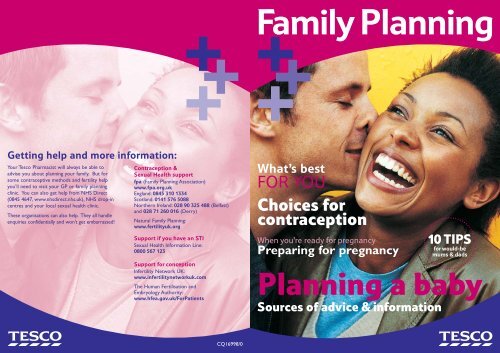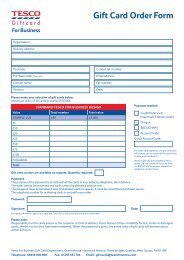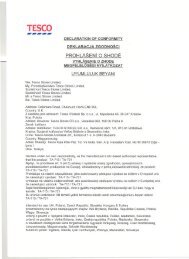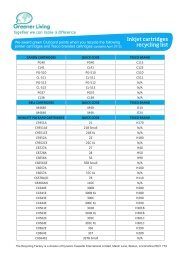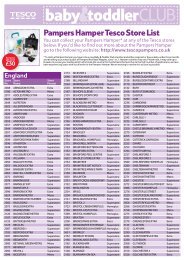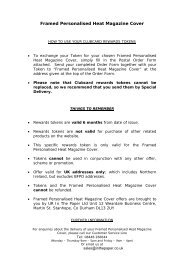Preparing for Pregnancy - Tesco
Preparing for Pregnancy - Tesco
Preparing for Pregnancy - Tesco
Create successful ePaper yourself
Turn your PDF publications into a flip-book with our unique Google optimized e-Paper software.
Getting help and more in<strong>for</strong>mation:<br />
Your <strong>Tesco</strong> Pharmacist will always be able to<br />
advise you about planning your family. But <strong>for</strong><br />
some contraceptive methods and fertility help<br />
you’ll need to visit your GP or family planning<br />
clinic. You can also get help from NHS Direct<br />
(0845 4647, www.nhsdirect.nhs.uk), NHS drop-in<br />
centres and your local sexual health clinic.<br />
These organisations can also help. They all handle<br />
enquiries confidentially and won’t get embarrassed!<br />
Contraception &<br />
Sexual Health support<br />
fpa (Family Planning Association)<br />
www.fpa.org.uk<br />
England: 0845 310 1334<br />
Scotland: 0141 576 5088<br />
Northern Ireland: 028 90 325 488 (Belfast)<br />
and 028 71 260 016 (Derry)<br />
Natural Family Planning:<br />
www.fertilityuk.org<br />
Support if you have an STI<br />
Sexual Health In<strong>for</strong>mation Line:<br />
0800 567 123<br />
Support <strong>for</strong> conception<br />
Infertility Network UK:<br />
www.infertilitynetworkuk.com<br />
The Human Fertilisation and<br />
Embryology Authority:<br />
www.hfea.gov.uk/ForPatients<br />
CQ16998/0<br />
Family Planning<br />
What’s best<br />
FOR YOU<br />
Choices <strong>for</strong><br />
contraception<br />
When you’re ready <strong>for</strong> pregnancy<br />
<strong>Preparing</strong> <strong>for</strong> pregnancy<br />
10 TIPS<br />
<strong>for</strong> would-be<br />
mums & dads<br />
Planning a baby<br />
Sources of advice & in<strong>for</strong>mation
Family<br />
Planning<br />
Contents<br />
3 The best way <strong>for</strong> you<br />
4 What are your choices?<br />
5 Choosing a condom<br />
9 Other contraceptive methods<br />
Natural methods<br />
10 USING HORMONES<br />
12 Problem infections<br />
13 Unplanned pregnancy<br />
14 WHEN YOU’RE READY<br />
16 <strong>Preparing</strong> <strong>for</strong><br />
pregnancy<br />
19 10 TIPS FOR WOULD-BE<br />
MUMS AND DADS<br />
20 Sources of advice and in<strong>for</strong>mation<br />
2<br />
FAMILYPLANNING<br />
“Nowadays, if you wish, you can<br />
usually plan your family. You can<br />
choose to conceive when the time’s<br />
right - then confidently prepare <strong>for</strong><br />
conception and usually have a happy,<br />
healthy pregnancy.<br />
“Perhaps the best feeling in the world is to<br />
want a baby - and then find out you’re going<br />
to have one.<br />
“Perhaps the worst feeling in the world is to<br />
find out you’re pregnant when you don’t<br />
want to be.<br />
“This booklet gives some in<strong>for</strong>mation on the<br />
choices open to you and contains some of<br />
the details you need to make the decisions<br />
that are right <strong>for</strong> you.<br />
“If you’re ready to have a child right now, the<br />
booklet will help you choose the best time<br />
and prepare in the best way. It’ll advise you<br />
how to find out whether you’re pregnant and<br />
how to get support when conceiving isn’t easy.<br />
“I hope that you find it a useful guide to<br />
make the decisions that are right <strong>for</strong> you.”<br />
Susan Quilliam<br />
Susan Quilliam is an<br />
author,‘agony aunt’ and a<br />
member of the editorial<br />
board of the Journal of<br />
Family Planning and<br />
Reproductive Health Care.<br />
<strong>Tesco</strong> would like to thank<br />
the fpa (Family Planning<br />
Association) <strong>for</strong> their help<br />
in compiling this booklet.<br />
The best way <strong>for</strong> you<br />
“I’m delighted <strong>Tesco</strong><br />
Pharmacies provide family<br />
planning advice and my<br />
patients like it. <strong>Tesco</strong> Pharmacies<br />
are open until at least 8pm and<br />
have confidential consulting<br />
rooms. Do<br />
pharmacists get<br />
embarrassed?<br />
Not at all -<br />
they are just<br />
happy to help.”<br />
Dr Hilary Jones<br />
With a new partner, it’s important<br />
to discuss family planning well<br />
be<strong>for</strong>e you get to the bedroom.<br />
That way you don’t have to stop<br />
lovemaking to talk - and you can<br />
relax, knowing you’re on the<br />
same wavelength as a couple!<br />
3<br />
FAMILYPLANNING<br />
Use this checklist to work out what’s<br />
important to you. Then use the grid over<br />
the page as a guide to which method may be<br />
best <strong>for</strong> you. Remember that your choices<br />
and options might change as you get older.<br />
✔ Effectiveness: do I need<br />
complete reliability?<br />
✔ Protection: do I need to protect<br />
against infections?<br />
✔ Spontaneity: how easy and<br />
convenient?<br />
✔ Whose role: mine or my partner’s to<br />
use the contraceptive concerned?<br />
✔ Side effects: what are the<br />
possible side effects?<br />
✔ Reversibility: is it OK to wait<br />
to conceive?<br />
✔ Under my control: or with the<br />
help of a doctor?<br />
Talking it through<br />
An easy way to start the conversation is<br />
“I always use a condom. If you don’t have<br />
one, I do.” And if your partner won’t use<br />
protection? Don’t have sex with them!<br />
Even in a long-term partnership, make<br />
time to discuss contraception so you’re<br />
both happy with your choice.
What are your choices?<br />
Talk to your GP, practice nurse, Family Planning Clinic or pharmacist <strong>for</strong> advice on what <strong>for</strong>m<br />
of contraception will suit you best and what side effects you may encounter.<br />
Condom<br />
Female condom<br />
Latex /<br />
Diaphragm / Cap<br />
Natural family<br />
planning methods<br />
Combined pill<br />
Progestogen<br />
only pill<br />
Injection<br />
Implant<br />
IUD<br />
IUS<br />
Patch<br />
Male vasectomy /<br />
Female sterilisation<br />
98% most no his rarely immediate yes<br />
95% most no hers rarely immediate yes<br />
92-96% some no hers rarely immediate<br />
up to<br />
98%<br />
effectiveness<br />
when used<br />
correctly<br />
no yes both no immediate yes<br />
over 99% no yes hers sometimes<br />
99% no yes hers sometimes<br />
over 99% no yes hers sometimes<br />
over 99% no yes hers sometimes<br />
around<br />
99%<br />
protection<br />
against STIs<br />
spontaneity<br />
whose role<br />
no yes hers sometimes<br />
over 99% no yes hers sometimes<br />
over 99% no yes hers sometimes very quick<br />
over 99% no yes his or sometimes<br />
hers<br />
4<br />
FAMILYPLANNING<br />
side effects<br />
very<br />
quick<br />
very<br />
quick<br />
reversibility<br />
yes but needs<br />
a little time<br />
needs removing<br />
but then<br />
immediate<br />
needs removing<br />
but then<br />
immediate<br />
needs removing<br />
but then<br />
immediate<br />
designed to be<br />
irreversible<br />
under your<br />
control<br />
needs initial<br />
fitting by a<br />
practitioner<br />
prescription<br />
only<br />
needs prescription fitting<br />
by a only doctor<br />
needs renewing<br />
every 3 months<br />
- doctor’s visit<br />
needs replacing<br />
needs fitting<br />
every 3 years<br />
- by doctor’s a doctor visit<br />
needs replacing<br />
every 3-10 years<br />
- doctor’s visit<br />
needs replacing<br />
every 5 years<br />
- doctor’s visit<br />
prescription<br />
only<br />
needs an<br />
operation<br />
Source: fpa (Family Planning Association) February 2005 N.B. If it’s important to you and your partner to avoid pregnancy,<br />
spermicides alone or withdrawal are unlikely to be effective enough.<br />
Choosing a condom<br />
If people are having sex, or planning<br />
to, they need to be aware of the risks<br />
they’re taking and how to avoid them.<br />
Condoms are the ONLY <strong>for</strong>m of<br />
contraception to help protect against<br />
sexually transmitted infections as well as<br />
unplanned pregnancy.<br />
They’re easy to use, com<strong>for</strong>table and can<br />
be fun. <strong>Tesco</strong> healthcare department<br />
stocks the major brands and there are<br />
lots of different types to choose from<br />
<strong>for</strong> added enjoyment and safer sex!<br />
Even in a long-term relationship,<br />
where you’re sure of your partner’s<br />
sexual health, condoms can be a good<br />
contraception choice to avoid pregnancy.<br />
Where are they available?<br />
You can get male condoms free from<br />
family planning clinics, most sexual health<br />
clinics, NHS walk-in clinics and some<br />
general practices. Or you can buy them<br />
from supermarkets (such as <strong>Tesco</strong><br />
healthcare department), chemists,<br />
garages, vending machines and by mail<br />
order. Female condoms aren’t as widely<br />
available but some family planning clinics<br />
provide them and <strong>Tesco</strong> Pharmacies can<br />
order them <strong>for</strong> you. You can speak to<br />
your pharmacist in a discreet consulting<br />
room if you wish.<br />
5<br />
FAMILYPLANNING<br />
How to approach<br />
safer sex:<br />
BE CONFIDENT … Explain why it’s<br />
important to you that you and your partner<br />
use a condom.<br />
BE ASSERTIVE … If your partner won’t<br />
use a condom then say that you won’t have<br />
sex without one. You know what’s best <strong>for</strong><br />
your body, so say exactly how you feel!<br />
BE OPEN … If you find the subject<br />
awkward (a lot of people do) say so and<br />
persevere because it’s important you make<br />
your views clear.<br />
BE PRACTICAL … Don’t leave the<br />
discussion until the last minute. Talk about<br />
your views be<strong>for</strong>e you get carried away.<br />
Explain that you are concerned about your<br />
health and your partner’s.<br />
BE FUN … Remember sex should be<br />
enjoyable and condoms can be fun and sexy!
Problems<br />
If you get itchy or uncom<strong>for</strong>table<br />
using male or female condoms,<br />
diaphragms, caps, lubricants or<br />
spermicides - get advice from your<br />
doctor, practice nurse or pharmacist.<br />
The condom checklist:<br />
✔ DO always carry condoms with you so<br />
that you can enjoy sex without worrying.<br />
✔ DO explain why it’s important to you<br />
that your partner uses a condom.<br />
✔ DO make sure you know the right way<br />
to put on a condom - read the<br />
instructions in the packet.<br />
✔ DO open the foil carefully. Beware of<br />
jewellery, sharp or ragged fingernails or<br />
piercings which could tear the condom.<br />
✔ DO put the condom on be<strong>for</strong>e there is<br />
any sexual contact between you and your<br />
partner, and take it off carefully be<strong>for</strong>e the<br />
erection fades.<br />
✔ DO store condoms carefully in a cool,<br />
dry place away from direct sunlight.<br />
✔ DO make sure you use a new condom<br />
every time you have sex.<br />
Pure Pleasure from Mates<br />
For the ultimate<br />
pleasure, why<br />
not try the<br />
sensual new<br />
range from<br />
Mates condoms?<br />
✗<br />
✗<br />
✗<br />
✗<br />
✗<br />
✗<br />
6<br />
FAMILYPLANNING<br />
DON’T be tempted to take risks if a<br />
condom isn’t available.<br />
DON’T use a condom which has<br />
passed the expiry date printed on<br />
the back.<br />
DON’T use oil-based lubricants with<br />
latex condoms. Check the instructions<br />
that come with the lubricant to see if it<br />
is safe to use with condoms. The oil will<br />
damage the condom.<br />
DON’T use a condom more than once.<br />
DON’T have sex with a new partner if<br />
they won’t use a condom.<br />
DON’T put the used condom in the<br />
toilet - it might block it. Wrap it and<br />
put it in the bin.<br />
Advertisement Promotion<br />
Xtra Pleasure Mates Xtra Pleasure, uniquely<br />
shaped to seduce you and your partner.<br />
Sheer Pleasure Mates Sheer Pleasure, ultra<br />
thin condoms.<br />
Ultimate Pleasure Mates Ultimate Pleasure.<br />
This exciting selection pack offers you the<br />
chance to indulge in a variety of Mates Pleasure<br />
products - available in selected <strong>Tesco</strong> stores.<br />
Have more fun<br />
with safer sex!<br />
Durex Pleasuremax has an array of ribs<br />
and dots and Per<strong>for</strong>ma is designed <strong>for</strong><br />
longer lasting pleasure, while Durex<br />
Sensation has a multitude of raised<br />
dots <strong>for</strong> added enjoyment.<br />
Other additions to the<br />
Durex pleasure enhancing<br />
range are two lubricants -<br />
Play Heat and Play Feel -<br />
making sex better <strong>for</strong><br />
you and your partner.<br />
Remember, safer sex<br />
can be better sex –<br />
so always use<br />
a condom!<br />
www.durex.co.uk<br />
Ask your pharmacist<br />
<strong>for</strong> the product that<br />
suits you best.<br />
Try a tingle!<br />
A new pleasure enhancing<br />
condom from Durex is<br />
ensuring that safer sex is<br />
fun, sexy and sensual!<br />
New Durex Tingle is coated in<br />
a minty lubricant on both the<br />
inside and outside of the<br />
condom, to create a hot<br />
and cold tingling sensation,<br />
<strong>for</strong> mutual heightened pleasure.<br />
Tingle is also ‘easy-on’, meaning<br />
it is shaped to be easier to use<br />
and more com<strong>for</strong>table to wear.<br />
Advertisement Promotion
These days there is a wide<br />
choice of condoms<br />
available giving you the<br />
opportunity to select the<br />
right condom to suit your<br />
individual needs.<br />
You may choose to use<br />
different condoms <strong>for</strong><br />
different occasions to add<br />
extra fun to your sex life.<br />
Using condoms can be fun<br />
and, when used regularly<br />
they can become a<br />
natural and exciting part<br />
of <strong>for</strong>eplay, giving you<br />
and your partner the<br />
freedom to enjoy sex<br />
without the worry.<br />
Advertisement Promotion<br />
Choosing the right Condom <strong>for</strong> you<br />
For extra sensation<br />
Pasanté Ribbed has<br />
specially positioned raised<br />
ribs to help create<br />
additional sensation.<br />
For extra security<br />
Pasanté Regular condoms<br />
are shaped <strong>for</strong> improved<br />
com<strong>for</strong>t, sensitivity and feel<br />
and are lubricated with a<br />
spermicide <strong>for</strong> extra<br />
reassurance.<br />
For extra fun<br />
Pasanté Mixed Flavours<br />
are the ideal way to add<br />
extra fun to your love life.<br />
Each pack contains six<br />
exciting fruity flavoured<br />
and coloured condoms<br />
(Chocolate, Mint,<br />
Banana, Blueberry,<br />
Vanilla and Strawberry).<br />
To find out more about<br />
Pasanté Healthcare<br />
and our full range of<br />
products please<br />
visit us at<br />
www.pasante.com<br />
or ask your <strong>Tesco</strong><br />
Pharmacist<br />
Other contraceptive<br />
In addition to condoms, there are<br />
methods: other types of barrier protection:<br />
Diaphragm and cap<br />
Diaphragms and caps are both barrier<br />
methods to stop sperm. They need to be<br />
fitted at a GP practice or family planning<br />
clinic - the doctor or nurse will demonstrate<br />
how to use it and arrange a further<br />
appointment to check the fit, particularly<br />
after having a baby.<br />
Spermicide<br />
Spermicide comes in several <strong>for</strong>ms - tablets,<br />
foam, gel, creams, films - and you can buy it<br />
from <strong>Tesco</strong> Pharmacy <strong>for</strong> use as extra<br />
protection with condoms, diaphragms and<br />
caps. It helps to kill sperm but isn’t effective<br />
enough to use on its own. Spermicides are<br />
also available free on prescription.<br />
Natural methods<br />
Natural family planning (NFP)<br />
There are times in the month when it’s safer<br />
to have sex because pregnancy’s unlikely -<br />
you can tell these by carefully watching<br />
certain female body signs such as<br />
temperature, cervical mucus and the length<br />
of her menstrual cycle. These body signs<br />
may alter, so you need to be taught this<br />
method by a specialist Natural Family<br />
Planning (NFP) teacher. NFP is particularly<br />
welcomed by some faiths that don’t support<br />
other kinds of family planning.<br />
Withdrawal<br />
A man pulling out be<strong>for</strong>e he ejaculates<br />
is very natural and spontaneous. But it’s<br />
also very unreliable because sperm may leak<br />
out even be<strong>for</strong>e climax. If you absolutely<br />
can’t af<strong>for</strong>d a pregnancy, avoid this method!<br />
9<br />
FAMILYPLANNING<br />
None of the<br />
contraceptive<br />
methods on this page<br />
protect against<br />
sexually transmitted<br />
infections.<br />
Lubricants<br />
Lubricants - like petroleum jelly, lotions and<br />
body oils - make intercourse more<br />
com<strong>for</strong>table. But oil based lubricants may<br />
weaken male latex condoms, diaphragms and<br />
caps - so keep these well away from each other.<br />
Vasectomy and Sterilisation<br />
When you’ve completed your family, or<br />
decided you don’t want children, you may<br />
wish to talk to your GP about male<br />
vasectomy or female sterilisation.<br />
After the menopause<br />
If you’re a woman who’s past the menopause,<br />
it’s very unlikely you’ll conceive if you’ve not<br />
had a period <strong>for</strong> two years - one year if you’re<br />
over 50. (But remember that you’ll still need<br />
protection against infections. Check with your<br />
GP to be sure you will not conceive.)<br />
If you're having Advertisement Promotion<br />
problems in<br />
planning <strong>for</strong> a<br />
family, there’s a<br />
slight chance<br />
you could be<br />
experiencing the<br />
first stage of the menopause.<br />
Vielle Menopause Home Test Kit, available at<br />
<strong>Tesco</strong>, allows women to quickly, discreetly and<br />
accurately determine <strong>for</strong> themselves whether<br />
or not they are approaching the menopause<br />
in their own homes, without having to visit<br />
their doctor. However do talk to your doctor,<br />
practice nurse or pharmacist if you have<br />
any concerns.
Using hormones<br />
Are hormonal<br />
contraceptives<br />
right <strong>for</strong> you?<br />
✔Hormonal contraceptives<br />
are very reliable providing<br />
they are used properly.<br />
✔They don’t interfere with sex.<br />
Yes<br />
✔They’re under the woman’s control.<br />
✔They can help with painful periods or PMT.<br />
✔Some hormonal contraceptives can protect<br />
against pelvic infections, fibroids, cysts and<br />
some types of cancer.<br />
The Pill<br />
There are two sorts. The progestogen only<br />
pill (POP or mini pill as it used to be called)<br />
contains the hormone progestogen and is<br />
taken every day without a break. The other<br />
is the combined pill (COC) which contains<br />
both oestrogen and progestogen and is<br />
taken <strong>for</strong> three weeks (21 days) out of<br />
every four. During the fourth week when<br />
no pills are being taken a woman will have<br />
her 'pill period' known as a withdrawal<br />
bleed. Some combined pills are known as<br />
Everyday (ED) Pills as they are packaged<br />
with a week of placebo (or dummy pills) to<br />
use in week four. These are helpful <strong>for</strong><br />
women who are worried about<br />
remembering to start a new pack of pills<br />
after the week off. They are in every other<br />
way identical. There are many brands of<br />
combined pills.<br />
Implant<br />
A small tube about the size of a hair grip<br />
is placed under the skin and releases<br />
progestogen over three years. It has<br />
all the advantages of the pill.<br />
10<br />
FAMILYPLANNING<br />
✗ She’ll need to see a doctor or<br />
nurse in order to get them.<br />
✗ They may alter periods - which<br />
does no harm but can be annoying.<br />
✗ Some women may get side effects;<br />
though you can always change to<br />
another hormonal method.<br />
✗ If a woman has certain medical<br />
conditions, or wants to avoid the risk of<br />
certain conditions, she may not be able<br />
to use some hormonal contraceptives.<br />
Check with the doctor.<br />
✗ Hormonal contraceptives don’t protect<br />
against sexually transmitted infections.<br />
Unless both of you have been tested,<br />
you’ll need to use a condom.<br />
No<br />
Injection<br />
A hormonal injection slowly releases<br />
progestogen into the body - the effects last <strong>for</strong><br />
up to 12 weeks. There’s no need to remember<br />
to take pills! But if there are side effects, they<br />
last <strong>for</strong> 12 weeks too - and after injections are<br />
stopped, it may take a while to conceive.<br />
Patch<br />
A small thin patch is stuck on the arm,<br />
stomach or bottom, to release oestrogen<br />
and progestogen. Don’t worry, it won’t slide<br />
off; it’s waterproof! It needs renewing each<br />
week - but one advantage is that it can be<br />
used to postpone the monthly ‘bleed’.<br />
IUD and IUS<br />
The copper IUD and the progestogen IUS<br />
are small devices that are fitted in a woman’s<br />
womb by a doctor or nurse to prevent<br />
pregnancy. They may be uncom<strong>for</strong>table to fit<br />
and there might be a risk of infection around<br />
the time of insertion. They are very reliable,<br />
reversible and the IUD is effective <strong>for</strong> 3-10<br />
years (depending on type), while the IUS is<br />
effective <strong>for</strong> 5 years.<br />
Who can help?<br />
Hormonal contraceptives are free<br />
on prescription, from a GP or family<br />
planning clinic. <strong>Tesco</strong> Pharmacies are<br />
open every day <strong>for</strong> prescription<br />
fulfilment. Some private organisations<br />
also offer paid-<strong>for</strong> advice and<br />
contraception.<br />
Talk to your GP or practice nurse about<br />
which of these may be the right choice<br />
<strong>for</strong> you.<br />
11<br />
FAMILYPLANNING<br />
None of the<br />
contraceptive<br />
methods on this page<br />
protect against<br />
sexually transmitted<br />
infections.<br />
Forgetting<br />
If you know you may <strong>for</strong>get to<br />
take the pill each day, this isn’t<br />
the method <strong>for</strong> you!<br />
If you’ve missed a pill or vomited,<br />
use an extra contraceptive method<br />
like a condom. Certain antibiotics<br />
may also affect the pill’s reliability<br />
so alternative contraception may<br />
be required. The pill packet will<br />
have further instructions on what<br />
to do - or pop in and ask at your<br />
<strong>Tesco</strong> Pharmacy.
Problem infections<br />
Sadly, sex carries the risk of sexually<br />
transmitted infections (STIs). The<br />
more partners you have, the more<br />
at riskyou are. But you can even catch<br />
an STI the first time you have sex if your<br />
partner’s had sexual relationships with<br />
other partners without protection.<br />
If you have any of these symptoms, get a<br />
check-up. But be careful - many STIs show<br />
no symptoms at all.<br />
• pain or burning when you pass urine<br />
• itches, rashes or lumps on or around<br />
genitals<br />
• unusual discharge<br />
• pain or bleeding during sex or between<br />
periods<br />
• low abdominal pain or pain in your genitals<br />
Breaking the news<br />
It may feel scary to tell a partner<br />
that you have a sexually transmitted<br />
infection - or to be told that your<br />
partner has one. But if you don’t tell<br />
each other, then the STI will never get<br />
treated - and you may well end up<br />
passing it to and from each other.<br />
So tell your partner - and be grateful<br />
to a partner who is honest!<br />
Who can help?<br />
Most STIs can be completely cured if<br />
found early enough. For treatment see<br />
your GP, or <strong>for</strong> alternative confidential<br />
advice, go to a sexual health clinic - <strong>for</strong><br />
details, call NHS Direct (0845 46 47<br />
24hrs) or the Sexual Health Line<br />
(0800 567 123 24hrs) - or contact the<br />
fpa (Family Planning Association).<br />
12<br />
FAMILYPLANNING<br />
How to prevent<br />
✔ Many infections are very<br />
unlikely to be passed on if you<br />
use a condom.<br />
✔ No other <strong>for</strong>m of contraception<br />
helps to protect you.<br />
✔ So with new or irregular<br />
partners, use a condom all<br />
the time, even if you’re using<br />
another <strong>for</strong>m of contraception<br />
like the pill.<br />
✔ Once you are ready to have<br />
unprotected sex, it’s a good<br />
idea <strong>for</strong> both of you to get<br />
tested <strong>for</strong> STIs.<br />
UNPLANNED PREGNANCY<br />
Some things that might mean your<br />
chosen contraception or protection<br />
doesn’t or can’t work are:<br />
• you don’t have contraception with you<br />
• you’re so carried away you <strong>for</strong>get to<br />
use it<br />
• you don’t want to stop making love to<br />
fetch the contraception<br />
• using contraception would upset your<br />
partner so you don’t use it<br />
• the condom, diaphragm or cap splits<br />
or slips<br />
• the pill gets <strong>for</strong>gotten<br />
• you are ill and so the pill doesn’t work<br />
• you miscalculate your dates when using<br />
the natural family planning method<br />
• you actually want to have a baby but<br />
haven’t admitted that to yourself<br />
Some myths<br />
Yes, pregnancy can<br />
still happen even if... it’s<br />
your very first time...<br />
she’s on her period...<br />
she hasn’t<br />
climaxed...<br />
If you choose to have sex without contraception or protection,<br />
askyourself why. Realising the reasons behind your slip will help you<br />
make the right decision next time.<br />
13<br />
FAMILYPLANNING<br />
Emergency<br />
If you have had unprotected<br />
sex, you can still take action to<br />
avoid pregnancy if you act fast.<br />
Emergency contraception can<br />
be used. Askyour pharmacist<br />
or seek advice immediately<br />
from your GP, family planning<br />
clinic, sexual health clinic,<br />
NHS walk-in centre, or the<br />
organisations listed on the<br />
back of this booklet. To check<br />
<strong>for</strong> infection, you can both go<br />
to a sexual health clinic.<br />
Remember, once you’ve given birth,<br />
you still need to use contraception<br />
again as soon as you have sex to<br />
avoid getting pregnant again. Failing<br />
to use contraception just after birth<br />
is a very common cause of<br />
unplanned pregnancy.<br />
If you’re pregnant and don’t want to<br />
be, it’s important to talk to someone<br />
qualified to advise you, like your GP.
When you’re ready<br />
<strong>for</strong> pregnancy<br />
Talking it through<br />
It’s a good idea, particularly when you’re<br />
first starting a family, to swap notes be<strong>for</strong>e<br />
you make a final decision about whether<br />
and when you try <strong>for</strong> a baby.<br />
One good way to do this is to list the<br />
reasons you each have <strong>for</strong> wanting a child.<br />
List the tasks you know will be part of child<br />
rearing and who will do them. List the<br />
additional money and time you’ll need to<br />
spend on a child. List the changes that will<br />
happen to your lives after the birth -<br />
particularly, who will give up paid work.<br />
Then compare notes. Where you find<br />
differences, talk these through until you<br />
understand each other and agree as far<br />
as possible. It’ll also help to read some<br />
parenting books and talk to other parents<br />
to find out what parenting’s really like.<br />
Then make your decision with confidence<br />
that you both have the same attitude to<br />
creating a baby.<br />
Reasons to wait<br />
Sometimes having a baby may<br />
seem the solution to problems<br />
in some people’s lives. But if<br />
you have any of the following<br />
issues, the stress of parenthood<br />
will only make them worse:<br />
• only one of you wants a child<br />
• your relationship’s under strain<br />
• you have financial problems<br />
• you’re unhappy with yourself<br />
or your life<br />
Hold back until you’ve got<br />
things sorted between you.<br />
14<br />
FAMILYPLANNING<br />
Who can help?<br />
When you decide to start trying <strong>for</strong><br />
a baby,<strong>Tesco</strong> Pharmacists can support<br />
by advising you on nutrition, diet and<br />
vitamins, how to stop smoking, how<br />
and why you could use ovulation<br />
tests and pregnancy tests.<br />
Trying <strong>for</strong> a baby<br />
Awoman releases just one egg<br />
each cycle - a process known as<br />
ovulation. This is the 'fertile time',<br />
so if you want to maximise your chances<br />
of conception, you need to make love on<br />
the day be<strong>for</strong>e and the day of ovulation.<br />
However, sperm can live up to 7 days, so<br />
making love within a few days prior to<br />
ovulation can also result in pregnancy.<br />
An ovulation test will help you trackyour<br />
own unique cycle so that you can detect<br />
your most fertile time.<br />
Start well in advance<br />
You probably won't know you are pregnant<br />
until at least a few weeks after conception<br />
has occurred. But those first few weeks of<br />
pregnancy are the ones where your baby’s<br />
most vulnerable. So you both need to start<br />
looking after yourselves well be<strong>for</strong>e trying<br />
to conceive.<br />
15<br />
FAMILYPLANNING<br />
See the doctor<br />
Be<strong>for</strong>e actually trying <strong>for</strong> a baby, it's good<br />
<strong>for</strong> you both to go to see your GP to have<br />
a sort of 'MOT'. That way you can check<br />
your physical wellbeing and get advice on<br />
a lifestyle that will help you plan a happy,<br />
healthy pregnancy. You are then reassured<br />
that you are both physically and mentally<br />
ready to start trying <strong>for</strong> a baby.<br />
<strong>Pregnancy</strong> testing<br />
When a woman becomes pregnant her<br />
hormone levels change - she produces<br />
a hormone called human chorionic<br />
gonadotrophin (hCG) that can be<br />
detected in urine. If you think you might<br />
be pregnant you can buy a pregnancy<br />
test from <strong>Tesco</strong> - if used correctly it's<br />
just as accurate and reliable as going<br />
to the GP or Family Planning Clinic.
<strong>Preparing</strong> <strong>for</strong> <strong>Pregnancy</strong><br />
Whether you’re trying <strong>for</strong> a<br />
baby or trying to avoid having<br />
one, your local <strong>Tesco</strong><br />
Pharmacist can give you<br />
advice that’s free, immediate,<br />
and confidential; and can also<br />
advise you on the best<br />
supplements to maximise your<br />
health and to help with the<br />
birth of a healthy baby.<br />
16<br />
FAMILYPLANNING<br />
Ahealthy diet and lifestyle and a<br />
relaxed approach to conceiving may<br />
help you more than you first think.<br />
Being stressed about the matter won’t help<br />
at all, so do try to eat well, take gentle<br />
exercise and get plenty of rest and sleep.<br />
Being in the best of health contributes to<br />
your chances of conceiving and will help you<br />
to have a healthy pregnancy. A new baby can<br />
be physically and emotionally exhausting, so<br />
both partners should take good care of<br />
themselves when planning to conceive,<br />
throughout pregnancy and after the birth<br />
of the baby.<br />
Men can try boosting their intake of zinc,<br />
iron, selenium and foods rich in vitamin E,<br />
such as lean red meat, poultry, fish,<br />
wholegrain cereals and green vegetables.<br />
These foods benefit women too, as do foods<br />
rich in vitamin B6 such as wholemeal bread,<br />
bananas and peas. Avoid skipping meals even<br />
if you just have a light, healthy snack. Folic<br />
Acid is very important – ask your <strong>Tesco</strong><br />
Pharmacist <strong>for</strong> advice. For more tips <strong>for</strong><br />
would-be mums and dads, see page 19.<br />
Advertisement Promotion<br />
Testing <strong>for</strong> <strong>Pregnancy</strong><br />
and Ovulation<br />
You can find out easily if you are<br />
pregnant by using a home pregnancy<br />
test. When you are pregnant your<br />
body produces a hormone called human<br />
chorionic gonadotrophin (hCG) that can be<br />
detected in your urine. When per<strong>for</strong>med<br />
correctly most pregnancy tests are over<br />
99% accurate when used from the day your<br />
period is due. Some pregnancy tests have<br />
unique features which help ensure that you<br />
get a reliable result.<br />
Contrary to popular belief women’s<br />
menstrual cycles are not always 28 days,<br />
this is simply an average. Knowing your<br />
usual cycle length means that you’ll know<br />
when your period is due. Count the day<br />
your period starts (first day of full<br />
menstrual flow) as Day 1, and continue<br />
counting through to the day be<strong>for</strong>e your<br />
next period starts. The number of days is<br />
your cycle length <strong>for</strong> that cycle. If you<br />
make a note each time your period starts,<br />
you’ll understand your cycles much better.<br />
If you are trying to get pregnant, having<br />
an understanding of your own unique cycle<br />
becomes even more important. You are<br />
only fertile <strong>for</strong> a few days each cycle and<br />
are most fertile on only 2 of those days –<br />
close to the time that you ovulate (when<br />
your body releases an egg). When these<br />
days occur during the cycle varies<br />
between women and from one cycle to<br />
another. Clearblue Ovulation Test can find<br />
your two days by detecting the increase<br />
(surge) of Luteinising Hormone (LH) in<br />
your urine. The LH surge occurs approximately<br />
24-36 hours prior to ovulation.<br />
You are at your most fertile on the day of<br />
your LH surge and the day after; these are<br />
the best 2 days to conceive your baby.<br />
The tests are easy to use – like a<br />
pregnancy test - and are 99% accurate.<br />
Clearblue Digital <strong>Pregnancy</strong> Test<br />
displays a ‘Pregnant’ or ‘Not Pregnant’<br />
result in words so it’s very easy to read.<br />
www.Clearblue.info
What else do I need to know?<br />
If you find you do not get pregnant<br />
immediately, don’t panic - 90 out of<br />
every 100 couples become pregnant<br />
by the end of two years. But if this<br />
hasn’t happened after six months of<br />
trying, you may not be having sex at the<br />
fertile time. Try an ovulation kit so that<br />
you can be more accurate - or if you’ve<br />
been using natural family planning<br />
methods <strong>for</strong> contraception, use them to<br />
find out when you’re ovulating.<br />
Ovulation test<br />
An ovulation kit helps you identify your<br />
most fertile time by detecting an<br />
increase (surge) in Luteinising Hormone<br />
(LH) in your urine. The LH surge<br />
occurs prior to the release of an egg<br />
(a process known as ovulation). You<br />
are at your most fertile on the day your<br />
LH surge is detected and the day after.<br />
You can buy an ovulation kit from<br />
<strong>Tesco</strong> Pharmacy.<br />
Really wanting a baby and not already<br />
having become pregnant can put your<br />
relationship under strain. So if you’re<br />
feeling any of these things, remember,<br />
you’re absolutely normal: Losing desire...<br />
wanting to make love all the time...<br />
feeling bad about yourselves and each<br />
other... being angry... feeling some past<br />
mistake has caused the problem... feeling<br />
isolated... thinking you should split up...<br />
being anxious and depressed. The<br />
important thing is to cope together.<br />
18<br />
FAMILYPLANNING<br />
“We did have tests, but<br />
decided not to go <strong>for</strong> IVF.<br />
Then we relaxed - and<br />
three months later, I fell<br />
pregnant with Lucy.”<br />
Moira, 34<br />
Coping together<br />
If things are not going to plan, don’t blame<br />
yourselves or each other. Conception<br />
difficulties are no one’s fault. Keep talking<br />
about your thoughts and feelings.<br />
Get support from outside - family, friends and<br />
one of the organisations listed on the back<br />
cover of this booklet may be able to help you.<br />
If your relationship’s suffering, see a<br />
counsellor to help you get your relationship<br />
back on track.<br />
Who can help?<br />
Your first port of call if you want advice<br />
about conception is your GP or practice<br />
nurse. There are many factors involved in<br />
getting pregnant so you shouldn't<br />
automatically jump to conclusions if it<br />
doesn't happen straight away. If your GP<br />
feels it necessary, he or she may refer you<br />
to a specialist <strong>for</strong> tests. If the tests do show<br />
that you do have a 'medical problem' you<br />
may be able to get treatment through the<br />
NHS or can pay to go to a private clinic.<br />
10<br />
TIPS<br />
<strong>for</strong> would-be<br />
mums & dads<br />
3 Try to<br />
lose weight<br />
be<strong>for</strong>e conception,<br />
to avoid diabetes<br />
and high blood<br />
pressure during<br />
pregnancy.<br />
1<br />
Get fit,<br />
but don’t<br />
overdo it; too much<br />
6<br />
exercise may make<br />
conception harder.<br />
A daily walk will<br />
fit the bill.<br />
Avoid<br />
your cat’s<br />
litter box; it<br />
may contain<br />
harmful<br />
parasites.<br />
9<br />
5<br />
Start eating<br />
a balanced and<br />
nutritional diet<br />
and cut down,<br />
or cut out,<br />
drinking<br />
alcohol.<br />
Wear gloves<br />
while gardening<br />
& wash your hands<br />
afterwards to avoid<br />
infections that may<br />
harm your unborn<br />
baby.<br />
19<br />
FAMILYPLANNING<br />
Folic Acid<br />
and products<br />
like Pregnacare,<br />
which contains a special<br />
blend of 17 vitamins and<br />
minerals, including the<br />
recommended daily intake<br />
of folic acid, can help<br />
throughout your<br />
pregnancy.<br />
Smoking<br />
can affect the<br />
fertility of both<br />
men and women,<br />
and harm the baby.<br />
So try very hard<br />
to stop.<br />
7<br />
Avoid<br />
x-rays,<br />
including<br />
dental<br />
x-rays.<br />
2<br />
4<br />
Men<br />
should avoid<br />
tight trousers and<br />
underwear, especially<br />
made from synthetic<br />
materials, as they<br />
may lower sperm<br />
count.<br />
10<br />
8<br />
Avoid soft<br />
cheeses, paté,<br />
soft-boiled eggs, cold<br />
meats, liver and chilled<br />
foods - they may<br />
contain bacteria or<br />
other harmful<br />
substances.


